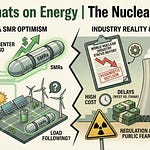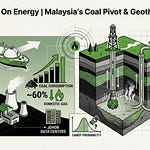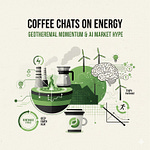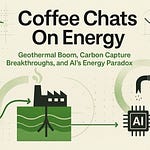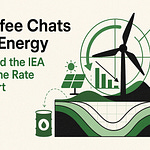Episode Length: ~17 minutes
Episode Summary
In this episode, Ian and Graham cover a wide range of fast-moving developments shaping energy reliability, hydrogen innovation, and carbon removal. They dive into the DOE’s new reliability report, the policy implications of the One Big Beautiful Bill Act (OBBBA), and the shifting balance between sustainability and reliability in both North America and Europe. They also spotlight Gold H2’s promising biostimulated hydrogen trial and Microsoft’s direct air capture initiative integrated with data centers. The conversation highlights how technology, capital, and policy are colliding to redefine the energy landscape.
Topics Covered
DOE Reliability Report – Findings on grid stress, load growth, and retirements of dispatchable resources.
Policy Shifts under the OBBBA – Impacts on renewables, nuclear, CCUS, and fossil fuels.
Reliability vs. Sustainability – How Europe and North America are reprioritizing energy security.
Gold H2’s Biostimulated Hydrogen – Using microbes in depleted oil fields to generate low-cost hydrogen.
Microsoft’s DAC in DC – Leveraging data center waste heat for direct air capture of CO₂.
Efficiency vs. New Capacity – Re-evaluating the role of efficiency in managing load growth.
Key Takeaways
Grid reliability is under increasing pressure as dispatchable baseload resources retire, even as load growth accelerates.
Policy changes in the OBBBA tilt incentives toward dispatchable and low-carbon baseload technologies, while pulling back support for intermittent renewables.
The global discourse is shifting toward prioritizing reliability and cost over sustainability—though environmental pressures may swing it back.
Gold H2’s microbial hydrogen production could open a new pathway for cheap, scalable hydrogen without subsidies.
Microsoft remains the dominant corporate buyer in the carbon removal market, using innovative DAC approaches tied to data centers.
Efficiency improvements, particularly through co-generation and waste heat reuse, may be an underutilized lever for addressing power demand.
Coffee chats are casual conversations On Energy, hosted live on LinkedIn. Opinions are my own, not investment advice or views of my employer.
Disclaimer
The views and opinions expressed are solely my own and do not necessarily reflect those of my employer or any affiliated organizations. Content is provided for informational purposes only and should not be taken as investment, legal, or professional advice. Please conduct your own research and seek guidance from qualified professionals before making decisions.


